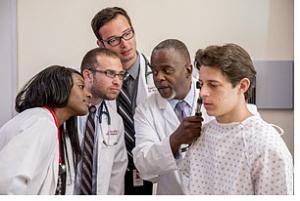

 The Center’s controlled environment, simulator technology and capacity for feedback and evaluation builds knowledge and confidence in students by reinforcing skills and concepts in their curricula: patient histories, physical examination techniques, and procedure training. The Center allows the curriculum to become alive in ways the lecture hall does not allow. When students examine Standardized Patients (SP’s), great care is taken to thread core science concepts into the clinical cases. The hands-on experience creates muscle memory for typical procedures enhancing patient safety in clinical practice. Brain and hand combine into “deliberate practice,” the same process by which professional athletes train: refining skills until they become experts. This cycle of reflective practice—planning, doing, studying, acting—yields optimized diagnostic reasoning and patient care with a sharp reduction of medical errors. In addition to feedback from instructors and SPs, students are asked to watch their interactions on-screen and reflect on areas of strength and improvement. This focus on the patient underlies the humanism at the core of the College curriculum.
The Center’s controlled environment, simulator technology and capacity for feedback and evaluation builds knowledge and confidence in students by reinforcing skills and concepts in their curricula: patient histories, physical examination techniques, and procedure training. The Center allows the curriculum to become alive in ways the lecture hall does not allow. When students examine Standardized Patients (SP’s), great care is taken to thread core science concepts into the clinical cases. The hands-on experience creates muscle memory for typical procedures enhancing patient safety in clinical practice. Brain and hand combine into “deliberate practice,” the same process by which professional athletes train: refining skills until they become experts. This cycle of reflective practice—planning, doing, studying, acting—yields optimized diagnostic reasoning and patient care with a sharp reduction of medical errors. In addition to feedback from instructors and SPs, students are asked to watch their interactions on-screen and reflect on areas of strength and improvement. This focus on the patient underlies the humanism at the core of the College curriculum.
First-year of study: The Clinical Skills and Simulation Center is immersed into the first-year of the curriculum by using trained standardized patients for the introduction of history taking skills, interpersonal communication skills, sensitive topics, physical exam skills, and overall patient assessment. Learned skills are then assessed during graded OSCEs and remediation sessions are incorporated as needed.
Second-year of study: During the second year of medical school training, students advance their clinical skills in preparation for clerkship year through activities at the Center both for instruction and assessment. Students engage in instructional sessions with varied forms of simulation including standardized patients, task trainers, and high fidelity simulators to integrate their learned knowledge and advance their communication skills.
Third-year of study: Instruction at the Center during third-year clerkships focuses on providing structured opportunities to safely practice core clinical skills and receive specific feedback to apply to their deliberate practice to achieve competence. The skills include but are not limited to procedures, communication skills, clinical reasoning, and communicating information regarding patients both verbal, and written.
Fourth-year of study: In preparation for graduation, students are provided with opportunities to assess and hone their advanced clinical skills necessary for effective clinical practice. This is accomplished through robust educational activities such as encounters with standardized patients practicing end of life discussions, procedures and mock code scenarios.